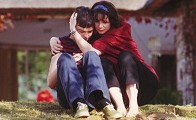
with Gabriel Byrne, Emily Watson, Miranda Richardson, Nicholas Hoult, Zachary Fox, Julie Walters, Celia Imrie, Julian Wadham, Sid Mitchell, Fenella Woolgar, Olivia Grant, Ian Roberts
release US 12.May.06, UK 2.Jun.06
05/UK 1h37

Not very hubbly-jubbly: Hoult and Watson



EDINBURGH FILM FEST
TORONTO FILM FEST
TRIBECA FILM FEST
 Support Shadows: Buy a Poster
Support Shadows: Buy a Poster
|
 For his writing-directing debut, actor Grant puts his childhood on screen. This is a deeply personal story about growing up under the microscope of an expat community.
For his writing-directing debut, actor Grant puts his childhood on screen. This is a deeply personal story about growing up under the microscope of an expat community.
In 1969 Swaziland, young Ralph (Fox) watches helplessly as his mother Lauren (Richardson) runs off with another man. His father Harry (Byrne), unable to cope, sends Ralph away to boarding school. A few years later Ralph (now Hoult) returns to find an American stepmother Ruby (Watson) stirring up things in the frightfully proper "hubbly-jubbly, wah-wah" English enclave, as Britain prepares to hand the nation back to its king. Stress about his job, and continuing feelings for Lauren, drive Harry to drink.
It does feel overwhelmingly trying for poor Ralph--not only is his father a terrible drunk, but his mother is shamelessly selfish, his stepmum refuses to play by the rules, and in this microcosm everyone makes everything their business. No wonder he develops a scary facial tic! Fortunately, he's so well played by Fox and Hoult that we travel this difficult journey with him. Both the pain and joy he discovers are achingly authentic, bolstered by a fine attention to detail in the writing, directing and performances.
The entire cast is superb. Watson and Byrne are especially strong, creating intriguingly layered characters. Walters and Imrie have played these women before, but in context they emerge as fascinatingly fragile figures who hold themselves together in very different ways. Everyone in this film is sympathetic to a degree--it's such a realistic portrayal of this kind of life that we can recognise honest attitudes, no matter how misguided they may be.
Grant directs in a dusty, scruffy 1970s style that really makes the most of his locations; it was filmed completely in Swaziland, which seems untouched by time. He tries several artful touches, some of which work nicely, and the script has more than a few lost plot threads and ill-defined characters. But the relationships are so bracingly recognisable that the film will be difficult for some to watch--snobbery, feuding, indiscretions, denial, fury. And in the end, it's a remarkable ode to both an imperfect father and an emerging nation.
 |
themes, language, some violence | 5.Apr.06 |

 Alan Cook, Altadena CA:
Alan Cook, Altadena CA:  "I was invited to a preview because I have been involved with puppet theater all my life, and puppets play a part in the life of a young man who sees his family disintegrate around him. Puppets or other art forms can help kids get through horrendous problems. I have witnessed this process many times. So that drew me to the film, but I was engrossed by the true-to-life story of one kid's survival. I was also deeply impressed by the compassion for flawed adults, expressed by the autobiographcal script. Richard Grant learned much about values as well as human failings and he was lucky to have a positive influence from Ruby, the American stewardess his dad married on the rebound from divorce. This is a very human story, beautifully told. The cast is great, the sense of place is beautifully photographed. And it is good to have meaning on screen." (15.May.06)
"I was invited to a preview because I have been involved with puppet theater all my life, and puppets play a part in the life of a young man who sees his family disintegrate around him. Puppets or other art forms can help kids get through horrendous problems. I have witnessed this process many times. So that drew me to the film, but I was engrossed by the true-to-life story of one kid's survival. I was also deeply impressed by the compassion for flawed adults, expressed by the autobiographcal script. Richard Grant learned much about values as well as human failings and he was lucky to have a positive influence from Ruby, the American stewardess his dad married on the rebound from divorce. This is a very human story, beautifully told. The cast is great, the sense of place is beautifully photographed. And it is good to have meaning on screen." (15.May.06)
HOME | REVIEWS | NEWS | FESTIVAL | AWARDS | Q&A | ABOUT | TALKBACK